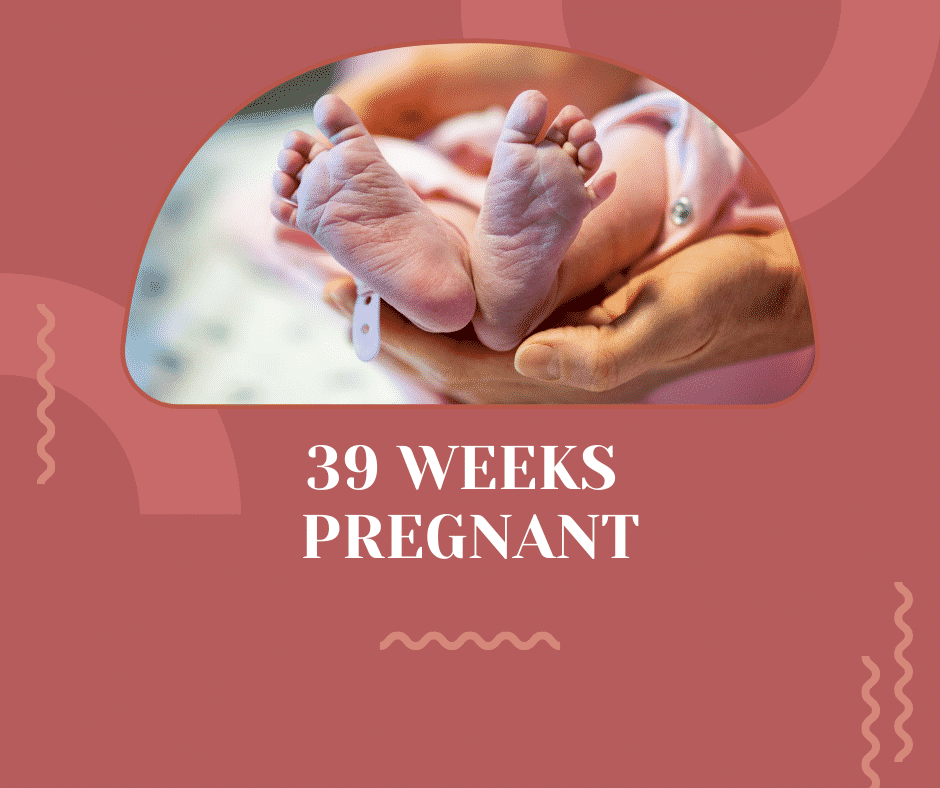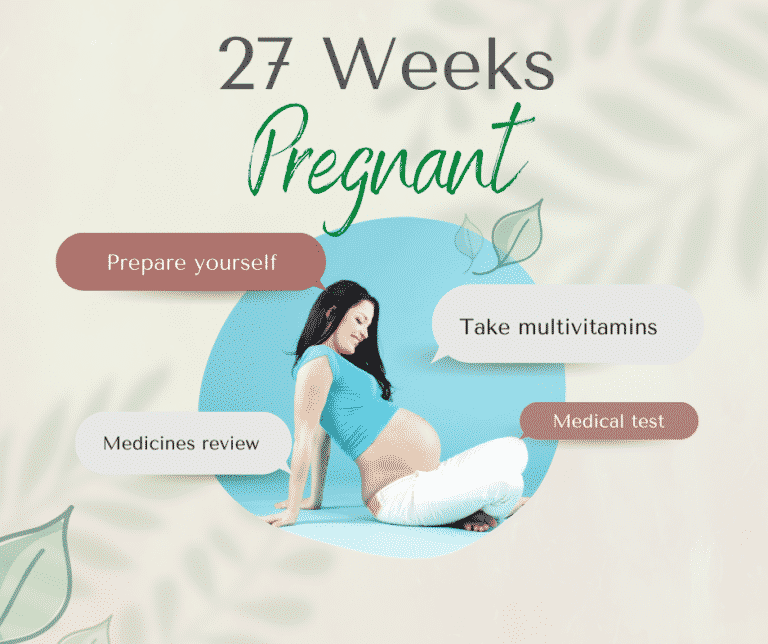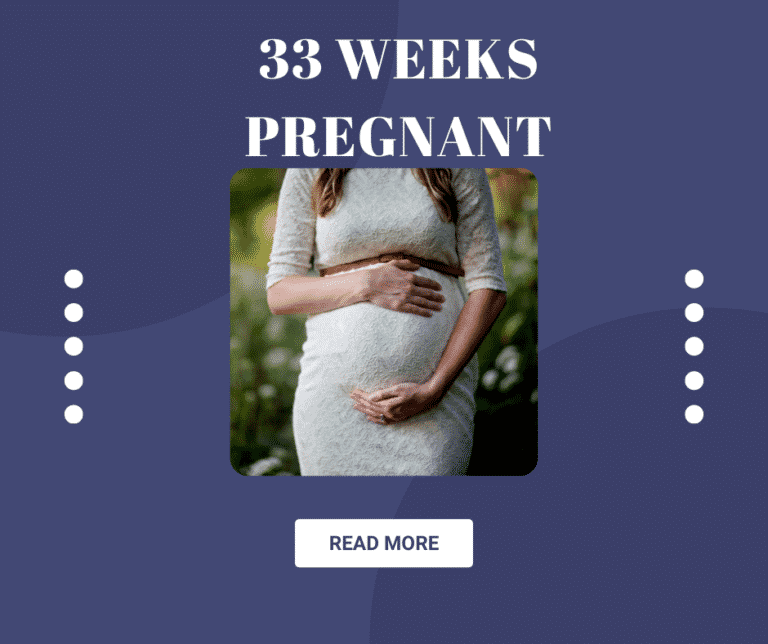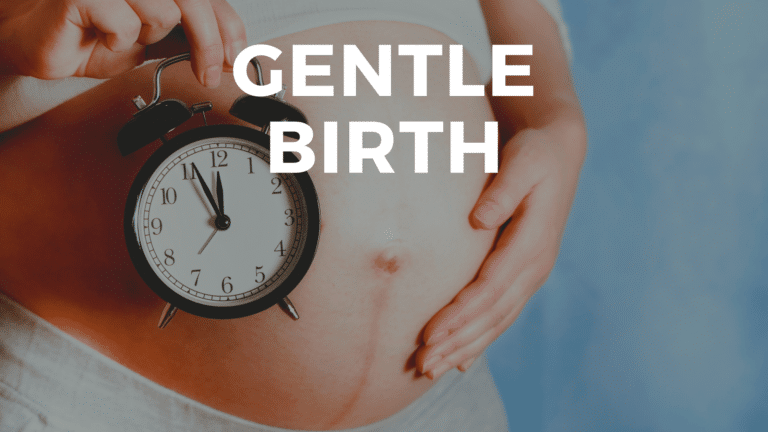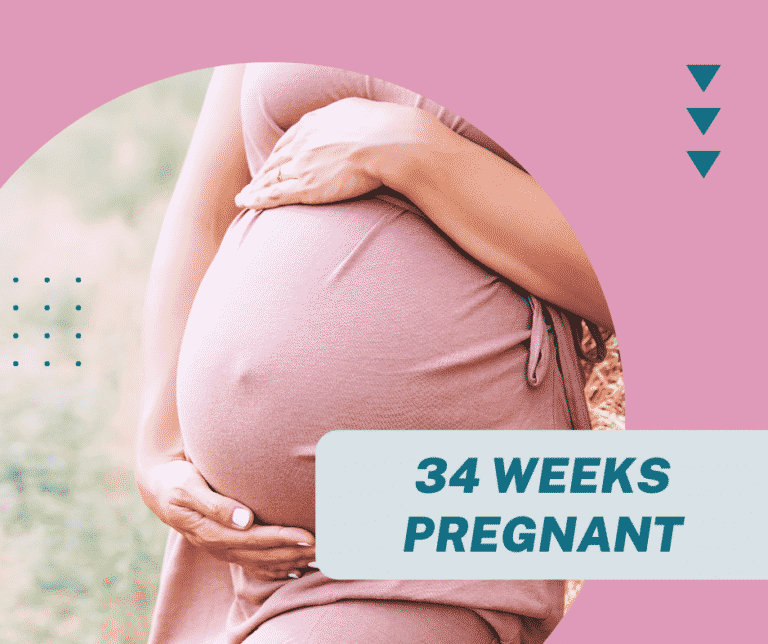39 Weeks Pregnant: Signs, Tips, Symptoms & Baby’s Development
Published on April 13, 2022 – Last Updated on October 18, 2022
If you are like most pregnant women, you are eagerly counting down the days until your baby is born. But even if you aren’t quite ready for labor and delivery, there’s no need to worry – according to the American College of Obstetrics and Gynecology, only about 5 percent of babies born Fweighon their due dates. Most will arrive within two weeks of that date, so you still have plenty of time to get ready at 39 weeks pregnant!
While every pregnancy is different, a few things happen in the late stages of gestation regardless of how far along you are. So, In this blog post, we can discuss the changes in your body, symptoms, baby development, and the tips for a healthy pregnancy. So hold tight, and let’s get it started.
Mom’s Body: Pregnancy week 39
At 39 weeks pregnant, moms experience a lot of changes. Your belly is probably very large, and you may have difficulty moving around. You may also be feeling bloated and uncomfortable. As your due date approaches, you may experience Braxton Hicks contractions. These are normal and help to prepare your body for labor.
You may also notice that your baby is dropping lower into your pelvis. This is called lightning, and it can happen a few weeks before labor begins. If this is your first baby, you may not notice lightning until you are in labor. However, if you have had a baby before, you may see lightning a few days or weeks before labor begins. Be sure to inform your health care provider if you have any signs of labor, such as contractions, a bloody show, or loss of the mucous plug. Read more about contractions: contraction counter app, pregnancy contractions timer, how to contraction counter.
39 weeks pregnant: Your baby’s development
At 39 weeks pregnant, your baby is the size of a watermelon. They weigh about 7.5 pounds (Sometimes baby’s birth occurs with that birth weight) and are about 20 inches long. Her head is getting bigger as her brain grows, and she’s gaining more fat to keep her warm. Her lungs are developed, but they may not be fully mature. Your baby’s movements are slowing down because she’s running out of room in your uterus. You may feel her hiccups as she practices breathing.
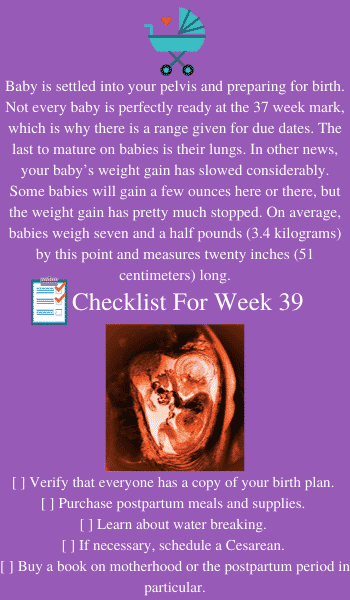
You may also notice that your baby has a regular sleeping pattern. As you near your due date, your cervix will start to thin out and open up in preparation for labor. You may experience Braxton-Hicks contractions, which are practice contractions that help to soften and thin your cervix. Let’s discuss some significant factors:
Baby’s Head:
The baby’s head is engaged in the pelvis and has been for some time. This means that the baby’s head is down and pushes against your pelvic floor and pubic bone. If this is your first baby, the baby’s head may not fully engage until labor begins.
Make sure you check out our other posts related to the 39th week of pregnancy: what is the best due date calculator & pregnancy process week by week.
Baby’s Brain:
The baby’s brain is growing and developing rapidly. The baby’s brain will be almost fully developed by the end of this week.
Baby’s Body:
The baby is getting bigger and has more fat stores. This helps to keep the baby warm. The baby’s body is also preparing for labor and delivery.
Baby’s Skin:
The baby’s skin is getting thicker and less wrinkled. This is because the baby is no longer in an amniotic fluid-filled environment.
Baby Position:
The baby is in a head-down position, with the head engaged in the pelvis. This position helps to prepare the baby for labor and delivery.
39 weeks pregnant: What are your symptoms?
If you’re 39 weeks pregnant, moms to be experiencing various symptoms. Many women report increased fatigue, back pain, and Braxton Hicks contractions during pregnancy. You may also have difficulty sleeping, mood swings, and trouble Keeping up with Your usual activities. Let’s discuss all of them in every detail:
Painless contractions
When you are near your bump, expect Braxton Hick’s contractions. These are perfectly normal and indicate that your body is preparing for labor.
Tiredness and sleeping problems.
This is a common complaint during the last few weeks of pregnancy, as your body is working harder than ever to prepare for labor. So get as much rest as possible and avoid sleeping on your back.
Stretch marks.
As your bump grows, so will the likelihood of you developing stretch marks. Unfortunately, there’s not much you can do to prevent them, but using a good-quality moisturizer may help.
Swollen and bleeding gums.
This is caused by the increase in hormones during pregnancy. It’s nothing to worry about, but make sure you brush your teeth regularly and see your dentist if it becomes a problem.
Pains on the side of your belly
It is caused by your expanding womb (round ligament pains). These are harmless but can be quite painful. They usually occur in the second or third trimester and disappear after labor.
Piles.
Pregnant women are more prone to piles, partly because the extra weight of the baby puts pressure on the veins in the rectum. To help relieve the pain, try using a cold compress or a topical cream.
Headaches.
It’s not unusual to get occasional headaches during pregnancy, especially in the later stages. Tiredness, dehydration, and changes in your blood pressure (blood flow) can all be responsible for them.
Backache.
Backache is another common complaint during pregnancy, often caused by the extra weight of the baby pressing down on your spine. So again, make sure you maintain a good posture.
Mood swings.
Hormonal changes can cause you to feel unusually emotional in the last few weeks of pregnancy. Just relax and let the mood pass – it won’t last long.
Itchy skin.
This is caused by the increased production of oil and sweat glands in your skin. Try not to scratch.
39 Weeks Fetus
By 39 weeks, your baby is fully developed and ready to meet the world. You may be feeling impatient to meet your little one and eager to get the pregnancy over with at this point in your pregnancy. However, it’s important to remember that 39 weeks is the full-term mark – meaning that your baby is healthy and developing typically.
Inducing labor before 39 weeks can increase the risk of complications for you and your child. For this reason, it’s best to wait until at least 39 weeks before considering induction. In the meantime, enjoy the time you have left with your growing belly! Soon enough, you’ll be holding your baby in your arms.
Tips for you this week
If you’re 39 weeks pregnant, you’re probably feeling very anxious and excited about meeting your baby. Here are a few things that you can do to help yourself this week before the baby’s arrival:
Try to stay active.
Walking is a great way to keep your muscles strong and help you cope with the extra weight you’re carrying.
Drink Plenty of Fluids
Make sure that you’re drinking plenty of fluids, especially water. This will help keep you hydrated and may also help reduce any swelling you’re experiencing. Also, the doctor prefers to drink water as much because it reduces the chances of infections in your birth canal.
Rest as Much as Possible
Try to get as much rest as possible. This is when your body is working hard to prepare for labor and delivery.
Keep Doing kick Counts.
When you’re 39 weeks pregnant, it’s especially important to keep track of your baby’s kicks. This will help you make sure that everything is okay and that your baby is healthy. Make a point to do kick counts at least once a day.
Keep taking your prenatal vitamins.
Even if you’re very close to giving baby birth, it’s still important to keep taking your prenatal vitamins. These vitamins will help ensure that your baby is healthy and has all the nutrients.
Move your body slowly.
If you’re feeling anxious, it’s important to move your body slowly. This will help to keep you calm and prevent you from getting too worked up. Try some relaxation exercises or take a hot bath to relieve stress.
Tap your favorite stress-relieving strategies
If you have a stress-relieving strategy that works for you, tap into it this week. Do whatever it takes to relax, whether it’s deep breathing, journaling, or listening to music.
Use affirmations in preparation for labor and birth
If you’re feeling anxious about labor and birth, try using affirmations to help you relax. Repeat positive statements to yourself such as, “I am strong,” “I can do this,” or “My body was made for this.” Here are some free affirmations posts: positive pregnancy affirmations, birth affirmations, and hypnobirthing affirmations.
Advice for partners
For partners of women who are 39 weeks pregnant, it is essential to be supportive and help with any discomfort the mother may be experiencing. This may include things like back pain, Braxton Hicks contractions, and increased trips to the bathroom. It is also important to be aware of the signs of labor so that you can be prepared to help with any last-minute preparations or call for help if necessary.
In the meantime, partners can help by keeping the mother comfortable and distracted from her pain. For example, you can rub her back, give her a foot massage, or take her for a walk. By staying calm and being supportive, you can help your partner through this final stage of pregnancy.
Take care of her meal, help him with household work. At this stage, her mood swings very often, so you have to be careful about it and don’t let him cry or feel guilty; it has a harmful effect on the baby. You can also join some antenatal classes with her.
Doctor’s Visit: Call with a Doctor
As your due date approaches, you will likely have more frequent prenatal visits with your doctor or midwife. These appointments help ensure that you and your baby are healthy and allow you to ask any questions you may have about the upcoming birth. Your doctor may also schedule a biophysical profile (BPP) or non-stress test (NST). These tests help to assess your baby’s well-being and can be used to determine whether or not labor should be induced. In addition, the doctor may recommend some different products to help you in your pregnancy journey.
If you have any concerns about your health or your baby’s health, don’t hesitate to call your doctor or midwife. They will be able to provide guidance and support.
FAQs
What are the signs of labor at 39 weeks of pregnancy?
The most common signs of labor at 39 weeks include contractions, backache, and diarrhea.
Should I be resting at 39 weeks pregnant?
At this stage of pregnancy, it’s imperative to get plenty of rest. This will help your body to prepare for labor and delivery.
What are the chances of going into labor at 39 weeks pregnant?
The chances of going into labor at 39 weeks are about 10%. However, it’s important to remember that every pregnancy is different, and there’s no way to predict when labor will start.
Other Pregnancy Weeks:
- 1 Week Pregnant
- 2 Weeks Pregnant
- 3 Weeks Pregnant
- 4 Weeks Pregnant
- 5 Weeks Pregnant
- 6 Weeks Pregnant
- 7 Weeks Pregnant
- 8 Weeks Pregnant
- 9 Weeks Pregnant
- 10 Weeks Pregnant
- 11 Weeks Pregnant
- 12 Weeks Pregnant
- 13 Weeks Pregnant
- 14 Weeks Pregnant
- 15 Weeks Pregnant
- 16 Weeks Pregnant
- 17 Weeks Pregnant
- 18 Weeks Pregnant
- 19 Weeks Pregnant
- 20 Weeks Pregnant
- 21 Weeks Pregnant
- 22 Weeks Pregnant
- 23 Weeks Pregnant
- 24 Weeks Pregnant
- 25 Weeks Pregnant
- 26 Weeks Pregnant
- 27 Weeks Pregnant
- 28 Weeks Pregnant
- 29 Weeks Pregnant
- 30 Weeks Pregnant
- 31 Weeks Pregnant
- 32 Weeks Pregnant
- 33 Weeks Pregnant
- 34 Weeks Pregnant
- 35 Weeks Pregnant
- 36 Weeks Pregnant
- 37 Weeks Pregnant
- 38 Weeks Pregnant
- 35 Weeks Pregnant
- 36 Weeks Pregnant
- 37 Weeks Pregnant
- 38 Weeks Pregnant
- 40 Weeks Pregnant
- Birth Plan
- Baby Due Date Calculator
- EDD Calculation
- how many weeks pregnant I am
- Pregnancy Week By Week

